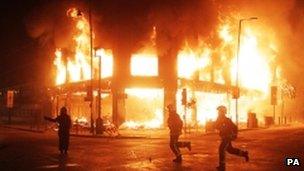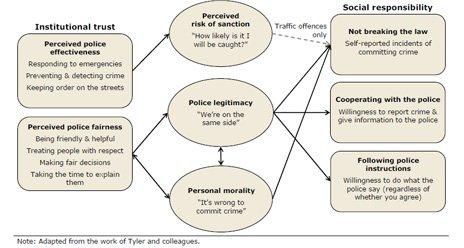Were the riots caused by bad manners?
- Published
- comments

Would better police manners have prevented the riots?
As Parliament, police and press have attempted to explain the cause of England's August riots in a series of reports over the last week, one surprising word has bubbled up to the surface.
No, it is not "criminality" or "underclass" or "greed". It is "courtesy" - or a lack of it from the police.
Today's Guardian /LSE Reading the Riots research reflects on how a "discourteous manner" from officers conducting stop and search in many of the districts where rioting occurred was a "significant factor in sparking the disturbances".
Last week's interim report, external from the government's Riots, Communities and Victims Panel found the same thing. "Many people told the Panel that police stop and search was consistently carried out without courtesy," their report to Ministers said. "The Panel calls on the police to work with communities and across forces to improve the way in which stop and search is undertaken."
And Scotland Yard's own reflections, external on the disturbance in the capital last week cited "a level of tension" among sections of the community that prompted the Met to note that stop and search must only be used "in an intelligent, professional, objective and courteous way."
In the immediate aftermath of the rioting and looting, it wasn't greater courtesy that people were calling for, but the introduction of water cannon, rubber bullets and exemplary punishment.
Prime Minister David Cameron called on the courts to be uncompromising in sentencing: "What happened on our streets was absolutely appalling behaviour and to send a very clear message that it's wrong and won't be tolerated is what the criminal justice system should be doing."
However, as the dust has settled, it appears that senior figures within government now accept that the causes of the August disturbances are complex and multi-faceted. Mr Cameron spoke in September of how some young people caught up in the riots had suffered from "a shortage of not just respect and boundaries but also love."
There is a growing body of evidence that, if you want people to obey the law, then the police must treat communities with courtesy, friendliness and fairness. The National Policing Improvement Agency published a fascinating report, Fair Cop, external, a few months ago which identified "treating people with respect" as a fundamental part of reducing crime.
"Trust enhances police legitimacy which, in turn, encourages people to help the police and not break the law. In other words, by making fair decisions and treating people fairly, the police should have an impact on crime in the longer term. The implications of motivating greater social responsibility are significant."
The findings went further, however, suggesting that respect was actually more important than catching criminals in getting people to obey the law. (I wrote about this phenomenon a couple of weeks ago.)
"Fair and respectful treatment predicted whether the public viewed the police as legitimate (rather than police effectiveness at responding to, and dealing with, crime)," the report said. It added that - with the exception of traffic offences - "the perceived risk of being caught and punished showed no statistical association" with offending behaviour.
This flow chart explains what they are on about:

It may be that the key lesson of the riots is about the importance of the principle of policing by consent. As the government's riots panel put it: "We have been told by a number of officers that they feel there has been a breakdown in one of the founding police principles: 'the police are the public and the public are the police'."
"In some communities, the police are no longer seen as members of the public who work full-time on duties which are also the responsibility of every citizen. Many people believe the police have significant work to do to rebuild trust and genuine cooperation."
Newsnight, external will broadcast an in-depth report - on the causes of the riots and how those who took part feel about the events - at 22:30 GMT on BBC Two on Monday 5 December.